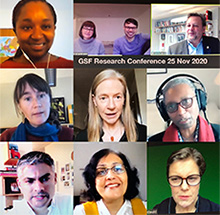News: Dec 08, 2020
Hands-on experiences of actual collaboration and joint projects are invaluable when it comes to exploring opportunities and establishing new partnerships. The “peer-to-peer learning” at the GSF Research Conference was organised as two parallel tracks of short presentations.
 A diversity of subjects, topics and constellations of people were introduced to the audience of mostly other researchers and students. More than a dozen researchers and groups presented their work: from "modified yeast to prevent anaemia" and improved cooking stoves to democracy and grassroots initiatives for innovations and solutions – and much more.
A diversity of subjects, topics and constellations of people were introduced to the audience of mostly other researchers and students. More than a dozen researchers and groups presented their work: from "modified yeast to prevent anaemia" and improved cooking stoves to democracy and grassroots initiatives for innovations and solutions – and much more.
Professor Ulf Svanberg, Food and Nutrition Science at Chalmers University of Technology, presented an important food security project with the Eduardo Mondlane University in Mozambique where the researchers have been able to improve the uptake of iron from bread; many children and women suffer from anaemia caused by iron deficiency.
Johan Uddling and Göran Wallin, Biology and Environmental Science at the University, have a long-standing collaboration with University of Rwanda, focusing on several aspects of forestation and forest-related poverty reduction. A number of PhD and Master students in Rwanda, finding work – even becoming ministers – in governmental administration help disseminate research findings. See also article based on presentation 27 April 2020.
Grassroots and co-learning in Kenya
María José Zapata Campos, Department of Business Administration at University of Gothenburg, presented “Environmental grassroots innovations: A circular economy from below” in one of the parallel sessions. Grassroots for Sustainability is a research team at University of Gothenburg studying how grassroots initiatives contribute to reducing the negative impact of cities on climate and environment.
“As researchers we have learned a lot, like how to acknowledge the innovations and solutions that grassroots develop themselves from below to address local and global challenges, how to include these grassroots working in practice and create the space for the exchange of knowledge”, explains Maria José Zapata Campos who is leading the project.
“These people, like the waste-pickers in Kisumu, Kenya, have helped us see things we would not have seen otherwise and together we have identified new research problems and questions”, María José says.
Richard Diamba Kiaka, PhD, also in Kisumu, Kenya, at Jaramogi Oginga Odinga University of Science and Technology, talked about co-learning and the opportunities for long-term relationships.
“Nevertheless, the complexities that characterize such projects, Richard Diamba Kiaka said, present the challenges that should not erode the gains, but rather inform the improvement of collaboration”.
Some 20 collaborative projects were presented by researchers and students in two different sessions, on various themes, and there were also students speed talks presented such as: Markus Zorn, “The Seedling project”, Austria, (a research-project to teach children about cycle of growing, seeds and waste-issues in Africa), Kim von der Heide; “Media framing and environmental (in) justice” and Jose Andres Hernandez presented “Maya Biosphere reserve” about vulcanos (to measure and track them) and possibilities or risks for vulcanos to erupt (different places in the world).
Photocollage by: Jan R (Photo: Annika K.)